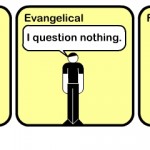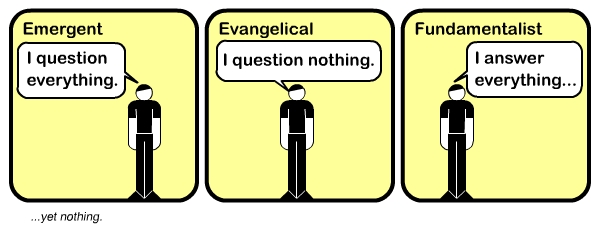 I’m beginning to scare myself.
I’m beginning to scare myself.
Why?
Long-held doctrines that I’ve held unswervingly to for years are beginning to teeter in my mind.
I can’t decide if this is good or bad, but one thing is for sure…it’s making me more humble. (You know you’re humble when you can brag about it.)
The Subtle Shift in My Theology
I’ve been noticing this shift for a while, but I was bowled over by it this morning on my walk to work. I was listening to a message by Donald Miller, author of Blue Like Jazz and I found myself agreeing with nearly everything he said (He is a fantastic speaker, by the way).
I remembered the first time I was introduced to this book. It was about 5 years ago. I was the Senior Pastor of a church, and someone gave it to me and told me I must read it.
I got through twenty or thirty pages before I tossed it in the garbage can. Literally. I think his book is the only book I have ever thrown out. I have books on my shelves written by Muslims and Mormons, none of which I have thrown out. Miller’s book got thrown across the room as hard as I could and into the garbage can (True story!).
Now, I find myself laughing and agreeing with what he is saying.
What Happened to Me?
So I asked myself this morning, “What has happened to me in 5 years?!?”
Some would answer “You went to seminary.”
That might be true. Seminaries (sometimes) have a way of making heretics out of us all. But just as one person’s garbage is another person’s treasure, so also, one person’s heresy is another person’s cardinal doctrine.
It is just that I seem to have fewer and fewer cardinal doctrines. Several of my “Doctrines to die for” are no longer so important.
Fewer Doctrinal Hills to Die On
 “What doctrines?” you ask?
“What doctrines?” you ask?
Not the “core fundamentals” like the Trinity, the inerrancy of Scripture, the deity of Jesus, and justification by faith alone in Christ alone. If I ever start to have misgivings these, please, somebody come kick me in the head…hard. I will defend these to my grave.
No, I am raising questions about various doctrines within ecclesiology, eschatology, angelology, and a few others.
How is this happening?
Some of these beliefs of mine are being undermined by the weight of exegesis. In other words, Bible study is making me doubt some of the theology I have been taught.
Below are a few areas I feel toppling.
Note that they haven’t toppled yet; they may right themselves, or like the Tower of Pisa, just lean over a bit. But I do not hold to these things as firmly as I once did.
I still believe these things to be true and biblical, but I am now aware of different ways of approaching these doctrines which require further study on my part.
My Current Leaning Towers of Pisa (why some might call me a heretic)
 Here is my current list of doctrines which I am questioning, and which might cause some to label me as a heretic:
Here is my current list of doctrines which I am questioning, and which might cause some to label me as a heretic:
- A literal, six-day-24-hour creation 6000 years ago. (Was Moses really writing a scientific treatise on how the universe began?)
- “Messianic” prophecy in the Old Testament. (It’s not all about Jesus. But see #3 below).
- Biblical Hermeneutics. (It’s all about Jesus, even the entire Old Testament.)
- A future seven-year Tribulation. (Some of the passages which seem to teach this may not do so after all.)
- Church. (The way we “do church” today is at best ineffective, and at worst, sinful.)
- Eternal, conscious torment in hell. (I am NOT a universalist or an annihilationist. I’m just not sure hell=torture.)
- The fall of Satan and his angels. (The Bible doesn’t seem to clearly talk about this.)
These are just a few of my own personal heresies.
Now you see why I have to go into church planting. There are not many churches in the country that would hire a pastor who has misgivings about this list of doctrines. (Are there any?)
The simple act of raising questions about these doctrines will probably cause some to brand me as a heretic.
In fact, in some churches and ministries, if I started to investigate alternative understandings for these doctrines, I’d probably get fired or cause a split.
…Maybe I should just sell cars or clean carpets…
2012 Update
As it turned out, I did get branded as a heretic. This post was written in December of 2007. Two months later, after some blog readers informed my boss I had written this post, I was fired from my job at a Christian publishing company.
And guess what? After months of searching for a job, I ended up cleaning carpets! I may be a heretic, but I am also prophetic! Kind of scary.
Here are some of the posts that explain more:
- From Crisis to Christless
- When Facing a Crisis
- My…Yawn…Crisis
- I Got a Job!
- Job Update
- One Year Later
- From Senior Pastor to Church Dropout
Eventually, I will write a book with chapters on each of the seven doctrinal areas above. Make sure you subscribe to the free email newsletter to get news, information, and a free copy of this book when it comes out.
Until then, what are your thoughts on any of the seven doctrines above which I had questions about? What do you think of branding people as heretics? Do you think a church or ministry should fire pastors and employees who begin to question their personal beliefs? Join the conversation below!




 There is a tendency in many Christian circles to think that if a particular theological viewpoint can quote a lot of Scripture, it must be right.
There is a tendency in many Christian circles to think that if a particular theological viewpoint can quote a lot of Scripture, it must be right.


 I am a fundamentalist.
I am a fundamentalist.

 I indicated in a
I indicated in a 
 OK, the cat is out of the bag (I guess it was never in the bag)…The article I referred to in the
OK, the cat is out of the bag (I guess it was never in the bag)…The article I referred to in the  But before I get to my practice, it is probably best to begin with what Stegall says a person must believe to receive eternal life. If I remember correctly, Stegall has five things he says must be believed if a person is to be born again. These five things were not listed in his article, but I think I heard him list them in a talk he gave at the Annual Fall Conference at Duluth Bible Church. (So my memory may be wrong on these five…).
But before I get to my practice, it is probably best to begin with what Stegall says a person must believe to receive eternal life. If I remember correctly, Stegall has five things he says must be believed if a person is to be born again. These five things were not listed in his article, but I think I heard him list them in a talk he gave at the Annual Fall Conference at Duluth Bible Church. (So my memory may be wrong on these five…).
